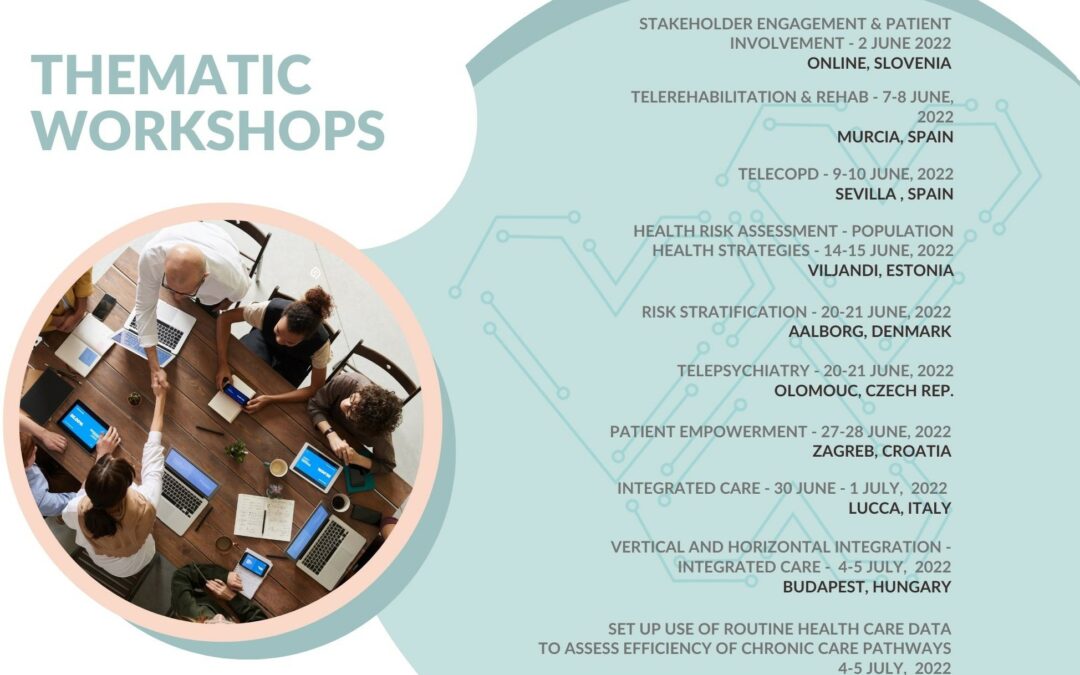For ensuring successful implementations, continuous support, monitoring and exchange of implementation experiences are essential. One instrument for providing these factors has been the organisation of Thematic Workshops, where NAs could report and discuss the intermediary results of their implementation. More than 320 participants joined the Thematic Workshops either onsite or online.
Thematic Workshops were scheduled at the end of the first half of the implementation phase. Their key objective was to share and discuss first implementation experiences and learnings while boosting visibility of their practices, communicating intermediary results with key stakeholders, and strengthening their networks through different collaborative self-evaluation activities at local and national levels. Each Thematic Workshop referred to a specific theme which was reflected with participants implementing the same adaptations in their sites.
In total, ten Thematic Workshops were organised in nine European countries hosted by Denmark, Italy, Spain (2 thematic workshops hosted here), Croatia, Estonia, Hungary, France, Slovenia, and the Czech Republic. All countries are characterised by different health systems, political regulations, structures, and challenges.
A wide range of activities was identified during the workshops based on existing and/or developing approaches at international, national, and local levels. Frequently mentioned as bottlenecks were time restrictions and finding adequate staff. Political engagement was very often identified as being of high importance to implement the project successfully even in the long term. It appears, that the implementation is characterized by a ‘’learning by doing’’ mentality by many NAs. It became clear, that all involved parties should be aware that such a health system transformation process is long and challenging and can only be achieved through effective cooperation with health professionals from the beginning. Moreover, the continuous monitoring of processes, strategies, and plans was highlighted to not be neglected.
Finally, all involved stakeholders, policymakers and project members should be made aware of the facilitators of successful implementation, such as: political leadership, strong and persistent motivation of all involved, and overcoming cultural barriers. In addition, it is key to ensure that potential barriers to success, such as complex IT solutions, data protection regulation and challenges through different healthcare systems, are addressed for further implementation steps.
Based on lessons learned from the ten Thematic Workshops, the following key results and learnings for each Good Practice were identified:
Basque health strategy on ageing and chronicity: Integrated care
- Understand the context: Good and thorough situation analysis is key to detect the needed response to the proelem identified.
- Smart composition of the implementation working group: Involvement of members of all health services and patients from the beginning, empowerment of the entire working group, and work with multidisciplinary teams that are pro-project.
- Learn from successes and failures: Follow the ‘’learning by doing “principle.
- Communicate: Inform all levels of the institution about the activities of the project.
- Involve from the beginning: Involve all relevant stakeholders from the start, and nurture cooperation among stakeholders from the beginning. This is crucial for fulfilling their role.
Catalan Center for Open Innovation on ICT-supported integrated care services for chronic patients
- Acceptance: Good practice transfer is a long and challenging process.
- Understand the context and the needs: Analysis is needed to clarify what infrastructure we need to make the use of the tool (risk stratification) sustainable. The Link to reimbursement needs a roadmap.
- Power of information: Quality of data is crucial.
- Collaboration: Collaboration with the practice owner is essential.
Optimedis
- Power of information: Define outcome and performance indicators based on value-based care principles, mobilise needed data sources, and strengthen analytical work.
- Communicate: Evidence is key for scaling up and improving the communication of findings.
- Think differently: Develop new health professions
- Communicate and involve: Jointly develop patient pathways and create a health professional network (stronger development of stakeholder relations)
Digital roadmap to an integrated health care sector
- Smart composition of the implementation working group: Involve health services and all the areas involved
- Learn from successes and failures: Follow the „learning by doing “principle
- Communicate, and involve from the beginning: Importance of the active involvement of patients with patient consent, and involvement of the relevant stakeholders from the moment a project begins/is planned
